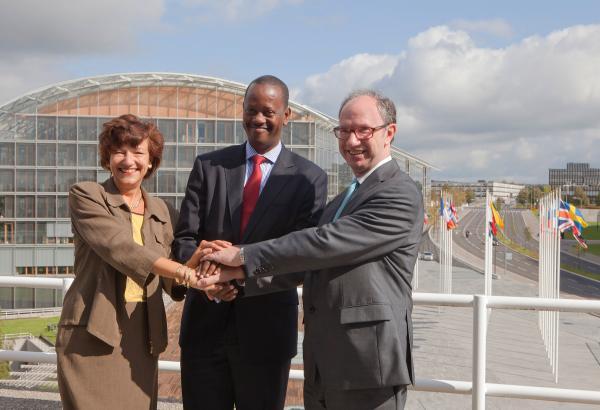
Medium and long-term financing for small businesses in Rwanda is set to be transformed by a EUR 8 million European Investment Bank funding package signed today with the Banque Rwandaise de Développement. The programme will target crucial long-term investment by local companies, mainly SMEs, to support growth and job creation. Banking activity in Rwanda predominantly focuses on providing short-term loans and access to long-term credit is recognised as a major constraint to economic growth in the country. The Rwanda Private Sector Support Initiative represents the European Investment Bank’s fifth engagement with the Banque Rwandaise de Développement.
The loan was signed earlier today at the European Investment Bank’s headquarters in Luxembourg by Jack Nkusi Kayonga, Chief Executive Officer of the Banque Rwandaise de Developpement and the European Investment Bank’s Vice President responsible for sub-Saharan Africa Plutarchos Sakellaris.
“Economic growth in Rwanda is setting the pace for the wider Great Lakes region and across East Africa. The European Investment Bank notes successful past cooperation with Banque Rwandaise de Developpement and is committed to supporting the local financial sector and stimulating future private sector development across Africa.” said Plutarchos Sakellaris, European Investment Bank Vice President.
“Working closely over many years with the European Investment Bank has enabled numerous Rwandan companies to benefit from long-term loans. This cooperation has also allowed the BRD to address crucial challenges on the path to international banking best practice and ensuring our staff can contribute to private sector growth in Rwanda.” said Jack Nkusi Kayonga, Chief Executive Officer of the Banque Rwandaise de Développement.
“Growth of the private sector is essential for economic development and poverty reduction in Rwanda. Continued support by the European Union’s long-term lending institution for BRD will not only benefit Rwandan business, but also help BRD better face future challenges.” said Ambassador Michel Arrion, Head of the EU delegation to Rwanda.
The European Investment Bank credit line will allow the Banque Rwandaise de Developpement to provide business loans in USD, EUR and Rwandan francs. Funding will focus on business sectors currently underserved by the commercial banks, notably agriculture, services, tourism and industry.
The Rwanda Private Sector Support Initiative will also include a dedicated technical assistance programme to enable Banque Rwandaise de Developpement to broaden lending activities, advise on electronic banking, improve risk and credit analysis and enhance the quality of their portfolio based on international best practice. Assistance will also be provided to addressing challenges of Corporate Governance, Corporate Social Responsibility and Internal Audit. This builds on significant progress in risk management made following previous technical assistance.
A total of 17 Rwandan businesses, including three firms receiving more than EUR 500,000, benefited from BRD support using the previous EIB financed programme. This funding led to over six hundred new jobs being created in agricultural, tourism, education and telecommunications companies.
Notes for Editors:
- The European Investment Bank, the long-term lending institution of the European Union, whose shareholders are the 27 European Union member states, has been active in Africa for over 40 years. EIB activities follow policies and objectives set down by European Union member states and whose Finance Ministers are the EIB’s Governors.
- Banque Rwandaise de Développement, a Public Company Limited by Shares, with a share capital of RWF 7,000,021,000 was incorporated on August 5, 1967, registered at the Officer of the Registrar General on 7/7/2011 and licensed by the National Bank of Rwanda on August 11, 2009. For more than four decades, BRD, the Government of Rwanda’s investment arm that finances the nation’s development objectives with a focus on the priority sectors of the economy, has been the sole provider of long term finance and has significantly facilitated the emergence of different productive enterprises in the private sector.

Photographer: EIB ©To be defined
Download original

Photographer: EIB ©To be defined
Download original

Photographer: IMEDIA ©To be defined
Download original

Photographer: imedia ©To be defined
Download original